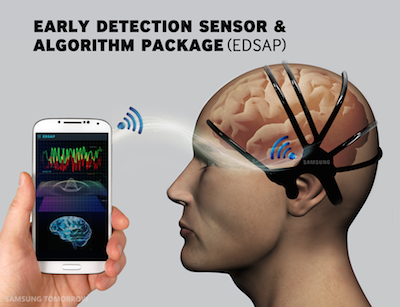Science Fiction
Dictionary
A B C D E F G H I J K L M N O P Q R S T U V W X Y Z
EDSAP Wearable Stroke Detection

Samsung engineers have developed a prototype wearable device - the Early Detection Sensor & Algorithm Package (EDSAP) - which can warn about impending strokes. The prototype device monitors brainwaves to detect early signs of strokes and alarms a user through a smartphone or tablet app

(Early Detection Sensor & Algorithm Package (EDSAP))
“We approached neurologists, asking them whether this was feasible,” said Se-hoon Lim, the project lead. “They were dismissive, but we wanted to give it a go. Health-related wearable devices are becoming more and more complex, meaning their capabilities are growing increasingly sophisticated. The five of us wanted to make our mark in this development.”In January 2015, Lim and his team introduced a prototype solution, the Early Detection Sensor & Algorithm Package (EDSAP), a stroke detection solution using brainwaves. Consisted of a sensor suite and a juiced up algorithm, EDSAP allows anyone with a smartphone or tablet to monitor the electrical impulses that are brainwaves, thereby gauging the probability of an oncoming stroke. The objective is to provide early warning, so that those at risk can visit the doctor for a proper diagnosis with sufficient time to prevent the potentially tragic consequences of a stroke.
How does EDSAP work?
EDSAP’s sensors are placed on a headset, collecting and wirelessly transmitting brainwave data to a mobile app, where the algorithm analyzes the brainwaves and ultimately determines the likelihood of a stroke, all within a 60-second time span. Additionally, by tracking brainwaves for longer durations, EDSAP can leverage its brainwave analysis capabilities to provide additional information related to neurological health, such as stress, anxiety and sleep patterns.EDSAP sensors are able to monitor and analyze brainwaves much faster than the 15 minutes or so required for existing brainwave monitoring equipment at hospitals. Secondly, the sensors are able to scan brainwaves in comprehensive detail, largely thanks to the highly conductive rubber-like material discovered by Lim and his team. Thirdly, the sensors are easy to wear. Saline solutions no longer need to be rubbed into the hair, removing the unpleasantries that had previously been a part of brainwave scanning. More importantly, in part thanks to the rubber-like material, EDSAP sensors can be scaled down into a variety of form factors reminiscent of everyday objects.
In his 1977 novel A Scanner Darkly, Philip K. Dick makes extensive use of the cephalochromoscope, a consumer device used for relaxation:
"Your cephalochromoscope that cost you nine hundred dollars, that you always turn on and play when you get home - Ernie and Barris were babbling away about it. They tried to use it today and it wouldn't work. No colors and no ceph patterns, neither one..."
(Read more about the cephalochromoscope or cephscope)
Via Samsung Tomorrow.
Scroll down for more stories in the same category. (Story submitted 1/22/2015)
Follow this kind of news @Technovelgy.| Email | RSS | Blog It | Stumble | del.icio.us | Digg | Reddit |
Would
you like to contribute a story tip?
It's easy:
Get the URL of the story, and the related sf author, and add
it here.
Comment/Join discussion ( 0 )
Related News Stories - (" Medical ")
Bone-Building Drug Evenity Approved
'Compounds devised by the biochemists for the rapid building of bone...' - Edmond Hamilton, 1932.
BrainBridge Concept Transplant Of Human Head Proposed
'Briquet’s head seemed to think that to find and attach a new body to her head was as easy as to fit and sew a new dress.' - Alexander Belaev (1925)
Natural Gait With Prosthetic Connected To Nervous System
'The leg was to function, in a way, as a servo-mechanism operated by Larry’s brain...' - Charles Recour, 1949.
Brain Implant Is Able To Capture Your Inner Dialogue
'So you see, you can hide nothing from me.'
Technovelgy (that's tech-novel-gee!) is devoted to the creative science inventions and ideas of sf authors. Look for the Invention Category that interests you, the Glossary, the Invention Timeline, or see what's New.
Science Fiction
Timeline
1600-1899
1900-1939
1940's 1950's
1960's 1970's
1980's 1990's
2000's 2010's
Current News
The New Habitable Zones Include Asimov's Ribbon Worlds
'...there's a narrow belt where the climate is moderate.'
Can One Robot Do Many Tasks?
'... with the Master-operator all you have to do is push one! A remarkable achievement!'
Atlas Robot Makes Uncomfortable Movements
'Not like me. A T-1000, advanced prototype. A mimetic poly-alloy. Liquid metal.'
Boring Company Drills Asimov's Single Vehicle Tunnels
'It was riddled with holes that were the mouths of tunnels.'
Humanoid Robots Tickle The Ivories
'The massive feet working the pedals, arms and hands flashing and glinting...'
A Remarkable Coincidence
'There is a philosophical problem of some difficulty here...'
Cortex 1 - Today A Warehouse, Tomorrow A Calculator Planet
'There were cubic miles of it, and it glistened like a silvery Christmas tree...'
Perching Ambush Drones
'On the chest of drawers something was perched.'
Leader-Follower Autonomous Vehicle Technology
'Jason had been guiding the caravan of cars as usual...'
Golf Ball Test Robot Wears Them Out
"The robot solemnly hit a ball against the wall, picked it up and teed it, hit it again, over and again...'
Boring Company Vegas Loop Like Asimov Said
'There was a wall ahead... It was riddled with holes that were the mouths of tunnels.'
Rigid Metallic Clothing From Science Fiction To You
'...support the interior human structure against Jupiter’s pull.'
Is The Seattle Ultrasonics C-200 A Heinlein Vibroblade?
'It ain't a vibroblade. It's steel. Messy.'
Roborock Saros Z70 Is A Robot Vacuum With An Arm
'Anything larger than a BB shot it picked up and placed in a tray...'
A Beautiful Visualization Of Compact Food
'The German chemists have discovered how to supply the needed elements in compact, undiluted form...'
Bone-Building Drug Evenity Approved
'Compounds devised by the biochemists for the rapid building of bone...'
